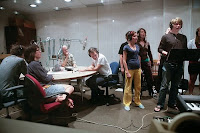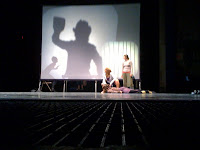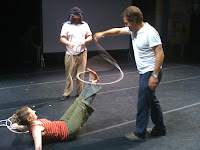A guest blog series by Christina Gutierrez, a Ph.D. student in Performance as Public Practice at the University of Texas at Austin

Tuesday found all of us—students, Rude Mechs, UT faculty and staff, not to mention an Austin radio icon—stuffed into KUT’s Studio 1B recording a podcast for John Aielli’s “Aielli Unleashed” radio show. During our hour of airtime, we recorded musical selections from Scenes 1 and 3, Lana, Kirk, Thomas, and Peter talked about the evolution and shape of the project as a whole and our work over the past week and a half, and Peter played snippets of music from the December workshop production. For the majority us, Tuesday’s field trip to KUT represented the first time we’d been in a recording studio, and the experience of singing in acoustically dead space while gathered around a microphone and wearing headphones was a bit surreal. Rehearsing the pieces in the enormity of the Payne theatre, it can be difficult to separate our vocal work from the world of projections and crazy rope dances. Although it seems obvious that radio is all about sound, Tuesday’s recording allowed time for all of us to take a break from the sometimes frenetic pace of the workshop and truly live in the music for an hour.
Listening to tracks from the Rude Mechs’ previous work on the piece next to the songs we’ve been so focused on learning was another reminder of how our work on distinct moments of the musical will fit into I’ve Never Been So Happy as a whole. Peter has written music ranging from opera to Texas twang to heavy metal, woven together into a piece that seems to be cohesive because of it’s variety. You can listen to the podcast here. For those who won’t have the opportunity to see Saturday’s workshop, hearing Peter’s eclectic score will give a great indication of the multi-genre extravaganza that he and the Rude Mechs are creating. You’ll have to imagine the fifteen foot shadow puppets and spastic rope choreography for yourself, though.

After the taping, we headed back to the Payne and dove into some intensive work on Scenes 5 and 6, adding details like a soft shoe dance performed by prison inmates and interweaving moments of dialogue with an incredibly high operatic solo sung by UT sophomore Julia Guitri. It is in this scene that the Julie/Jeremy/ mountain lion plot meets the Brutus/ Annabellee/dachsunds story as Brutus plots to propose marriage between Jeremy and Annabellee. As usual, the trick here is staging something that is cohesive enough for those members of Saturday’s audience who will not have seen the December workshop to follow, while still creating something that will inform later work on the piece. Here especially, then, the combination of spoken dialogue and song reflects the various story threads that begin to meet at this point in the piece. In continuing to build the musical bed of this section, it became apparent that Julie’s world in this scene is mostly operatic, while Brutus’ is spoken. The sheriff, who interacts with both characters, speaks and dances. The combination of musical theatre elements comes to represent the colliding plot lines.
On Wednesday, our last day in the space without live musicians, we worked each of the three scenes we’ll be showing on Saturday, with a focus on bringing together some of the specific moments we’ve been working on separately. We ran Scene 3 in its entirety, practicing the transition that occurs mid-scene from dragging each other across the floor with lengths of rope to choral singing. We added projections to Scenes 5 and 6, re-staging the conversation between Brutus and Jeremy at the end of the scene so that the audience sees both the live actors’ versions of Jeremy and Brutus and their puppet incarnations simultaneously. We ran Scene 1 numerous times, incorporating new projector effects and sections of spoken dialogue in between the verses of the nine minute long song. The time crunch is becoming more apparent, but the scenes are coming together (I’ll resist the temptation to saddle you with yet another rope weaving metaphor here). Working all three of the scenes like this, it was a bit of a shock to realize how much ground we’ve covered in eight days. The blocking notes I’ve written in my script range from “twirl prism in front of projector bulb while pulling knot across screen” to “three hops backward, fall over, spastic kick,” to “slowly drip water onto Jeremy silhouette.” And I’m the dramaturg. Thursday’s addition of the musicians will provide another collaborative layer to the work, and with it, another step in the development process.

